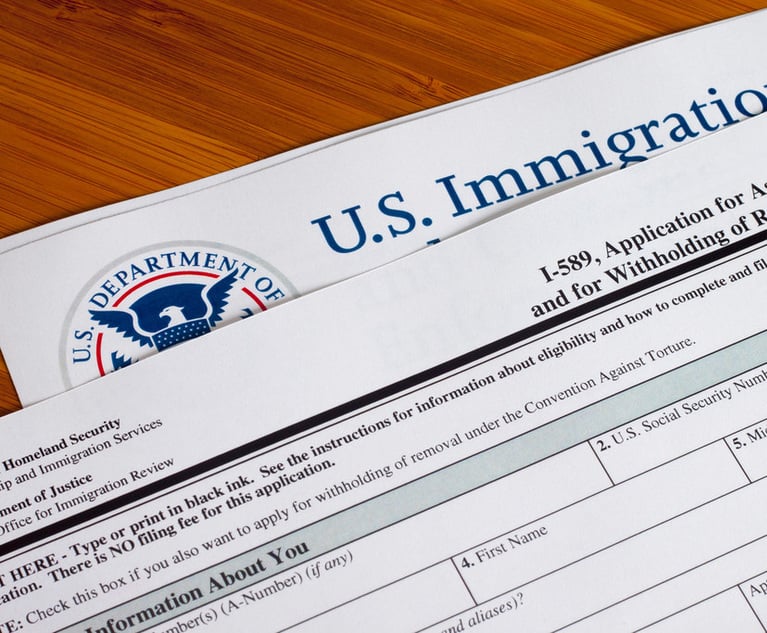Massachusetts Courts Mum About Policy After Judge's Alleged Sexual Misconduct
Massachusetts implemented a policy last year prohibiting discrimination, harassment and retaliation within its court system. The policy came soon after a state judge stepped down following sexual misconduct claims.
July 10, 2020 at 04:31 PM
4 minute read
 Trial Court of the Commonwealth, Cambridge, Massachusetts. Photo: Google maps
Trial Court of the Commonwealth, Cambridge, Massachusetts. Photo: Google maps
It should have been good news, but Massachusetts court officials are silent about a policy aimed at preventing retaliation and discrimination.
The policy followed a case that made statewide news in Massachusetts, when a former drug court clinician filed a 2018 lawsuit against a state judge for allegedly forcing her to perform sex acts on him in chambers.
That judge—Thomas Estes—resigned in June 2018, a day after being suspended indefinitely, according to news reports. He denied the allegations, claiming the sexual encounters were consensual.
And then in 2019—soon after the Estes episode—the Massachusetts Trial Court implemented policies prohibiting discrimination, harassment and retaliation in the court system and created a new Office of Workplace Rights & Compliance, which helped develop a detailed training program for all court judges and staff.
Daniel Sullivan, general counsel for the Trial Court, declined numerous requests for interviews to discuss the policy, and the Trial Court denied a request to provide data on sex harassment and discrimination cases in that state's court system going back seven years. The Trial Court said that, as part of the judicial branch of government, it is not subject to either the Freedom of Information Act or the Massachusetts Public Records Law.
The timing of the court's addressing discrimination within its ranks didn't come as a surprise to some in the legal arena in the Bay State.
While Boston attorney Elisa Filman said she doesn't know for sure whether the new Trial Court policies were in reaction to the Estes case, she said, "What happened with Judge Estes was probably the tipping point."
Filman, a founding partner with Rodman Employment Law, represents employees in disputes with their employers.
"The trial courts are adjudicating cases that are involving employment law like sexual harassment, when things like with Judge Estes is going on behind closed doors," she said. "They have some work to do."
Filman said that while it would have been better for the policies to have been implemented years ago, it's never too late.
"Maybe the Trial Court took culture cues and realized the system's credibility was on the line, and then promulgated this policy to thwart future bad acts," Filman said.
Others said the #MeToo movement could have also played a part in the Trial Court acting when it did.
Tara Swartz, founder of Swartz Law Boston, said the Estes saga, "coupled with the #MeToo movement," could have played a part in the timing of the new rules.
"It's never too late to institute a policy that will help train the workforce to be more knowledgeable of their actions in order to ensure that people are treating each other appropriately in the workplace," said Swartz, an attorney for two decades who said her practice dealing with sex harassment cases has grown over the last few years, in part, due to the #MeToo movement.
Boston attorney Nick Carter, a litigation partner at Todd & Weld, said Friday, "Certainly what is going on nationally with the #MeToo movement and the Black Lives Matter movement impacts the courts, as they do everything else. I'm sure the Trial Court is sensitive to those issues. … But the court system, like every institution, has a way to go."
Carter, also a member of the Massachusetts Bar Association's Judicial Administration Section Counsel, continued: "I think Ralph Gants, the chief justice of the Massachusetts Supreme Judicial Court, has a keen eye for making the justice system in the state more just."
Related stories:
Quinn Emanuel Courts #MeToo Victims, Shareholders With New Practice Group
Former Judge John Russo Ordered to Pay $250,000 in Law Clerk's Sexual Harassment Lawsuit
This content has been archived. It is available through our partners, LexisNexis® and Bloomberg Law.
To view this content, please continue to their sites.
Not a Lexis Subscriber?
Subscribe Now
Not a Bloomberg Law Subscriber?
Subscribe Now
NOT FOR REPRINT
© 2025 ALM Global, LLC, All Rights Reserved. Request academic re-use from www.copyright.com. All other uses, submit a request to [email protected]. For more information visit Asset & Logo Licensing.
You Might Like
View All

Trump Administration Faces Legal Challenge Over EO Impacting Federal Workers
3 minute read
Settlement Allows Spouses of U.S. Citizens to Reopen Removal Proceedings
4 minute read
Law Firms Mentioned
Trending Stories
- 1Chinese Firms Hire Partners from Kirkland and Paul Hastings in Hong Kong
- 2'He Used Some Colorful Language': Yale Defamation Case Survives
- 3Man Charged in Daylong Shooting Rampage in Memphis Is Serving as His Own Lawyer
- 4Counterpoint: FLA Is Committed To the Success of Legal Professionals
- 5Pa. Superior Court Rules Pizza Chain Liable for Franchisee Driver's Crash
Who Got The Work
J. Brugh Lower of Gibbons has entered an appearance for industrial equipment supplier Devco Corporation in a pending trademark infringement lawsuit. The suit, accusing the defendant of selling knock-off Graco products, was filed Dec. 18 in New Jersey District Court by Rivkin Radler on behalf of Graco Inc. and Graco Minnesota. The case, assigned to U.S. District Judge Zahid N. Quraishi, is 3:24-cv-11294, Graco Inc. et al v. Devco Corporation.
Who Got The Work
Rebecca Maller-Stein and Kent A. Yalowitz of Arnold & Porter Kaye Scholer have entered their appearances for Hanaco Venture Capital and its executives, Lior Prosor and David Frankel, in a pending securities lawsuit. The action, filed on Dec. 24 in New York Southern District Court by Zell, Aron & Co. on behalf of Goldeneye Advisors, accuses the defendants of negligently and fraudulently managing the plaintiff's $1 million investment. The case, assigned to U.S. District Judge Vernon S. Broderick, is 1:24-cv-09918, Goldeneye Advisors, LLC v. Hanaco Venture Capital, Ltd. et al.
Who Got The Work
Attorneys from A&O Shearman has stepped in as defense counsel for Toronto-Dominion Bank and other defendants in a pending securities class action. The suit, filed Dec. 11 in New York Southern District Court by Bleichmar Fonti & Auld, accuses the defendants of concealing the bank's 'pervasive' deficiencies in regards to its compliance with the Bank Secrecy Act and the quality of its anti-money laundering controls. The case, assigned to U.S. District Judge Arun Subramanian, is 1:24-cv-09445, Gonzalez v. The Toronto-Dominion Bank et al.
Who Got The Work
Crown Castle International, a Pennsylvania company providing shared communications infrastructure, has turned to Luke D. Wolf of Gordon Rees Scully Mansukhani to fend off a pending breach-of-contract lawsuit. The court action, filed Nov. 25 in Michigan Eastern District Court by Hooper Hathaway PC on behalf of The Town Residences LLC, accuses Crown Castle of failing to transfer approximately $30,000 in utility payments from T-Mobile in breach of a roof-top lease and assignment agreement. The case, assigned to U.S. District Judge Susan K. Declercq, is 2:24-cv-13131, The Town Residences LLC v. T-Mobile US, Inc. et al.
Who Got The Work
Wilfred P. Coronato and Daniel M. Schwartz of McCarter & English have stepped in as defense counsel to Electrolux Home Products Inc. in a pending product liability lawsuit. The court action, filed Nov. 26 in New York Eastern District Court by Poulos Lopiccolo PC and Nagel Rice LLP on behalf of David Stern, alleges that the defendant's refrigerators’ drawers and shelving repeatedly break and fall apart within months after purchase. The case, assigned to U.S. District Judge Joan M. Azrack, is 2:24-cv-08204, Stern v. Electrolux Home Products, Inc.
Featured Firms
Law Offices of Gary Martin Hays & Associates, P.C.
(470) 294-1674
Law Offices of Mark E. Salomone
(857) 444-6468
Smith & Hassler
(713) 739-1250










